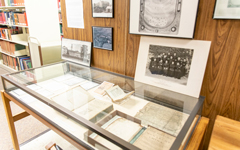
Woodstock Theological Library, one of the oldest and most notable theological libraries in the United States, will be integrated with Lauinger Library under a new agreement between the Maryland Province Jesuits and Georgetown University Library. Consolidating the libraries will make it easier for scholars and researchers to find the books they need and improve the preservation of Woodstock’s many rare and irreplaceable items.
Woodstock Theological Library is currently a separate library owned by the Maryland Province and housed on the lower level of Lauinger Library. The American Jesuits are reorganizing their province structures to reduce the number of administrators and to coordinate various apostolic works throughout North America. Locally, the Maryland Province merged with the USA Northeast Province effective July 31, 2020.
While the Jesuits' provincial reorganization is not directly responsible for the transition of the Woodstock Theological Library, it provided a good opportunity to re-evaluate the longstanding agreement between the Jesuit order and Georgetown University. "During negotiations, we realized it can be more efficient and easier for scholars if Woodstock and Lauinger become one combined library," said Ron Anton, S.J., superior of the Georgetown Jesuit Community.
Under the agreement, the Maryland Province has generously donated the 125,000 volumes in Woodstock’s circulating collection to the University Library. Those books will eventually be interfiled with Lauinger’s religion holdings. Books that are in high demand will be added to Lauinger shelves, while less-used materials will be stored in an offsite facility, but still available upon request. As a result, researchers who previously had to look for materials in both libraries will now only need to search one collection. Duplicate copies of titles available in both Woodstock and Lauinger that are no longer needed will be given to other Jesuit formation houses.
"We expect that combining the collections will increase the overall usage, because materials will be easier for students and researchers to find," said Harriette Hemmasi, dean of Georgetown University Library.
Woodstock also holds 14,000 rare items, some of which date as far back as the 11th century. Among these treasures are a 1548 first edition of the Spiritual Exercises of Ignatius of Loyola—the foundational document of Jesuit spirituality—and a first printing of the first edition of the Book of Mormon. Selected items from Woodstock’s rare book collection will be moved to the Booth Family Center for Special Collections which is better equipped to care for them properly. "The basement where Woodstock is located is not temperature controlled or fireproofed," said Leon Hooper, S.J., Head of the Woodstock Library. "Booth has an excellent reading room, environmentally controlled shelving, and a vault for the rarest items."
Many of Woodstock's special archival collections, including the John Courtney Murray Collection, the Woodstock College Archives, and the Journals of Teilhard de Chardin, are already stored off campus, and will now be managed by Booth. Much of that material has already been digitized and made accessible through DigitalGeorgetown. The Special Collections will remain the property of the Corporation of Roman Catholic Clergy, the remaining corporation of the Maryland Province, but will be on permanent loan to the University Library.
A Storied History
While the Woodstock Theological Library has been housed in Lauinger since 1975, its own history stretches to the 19th century. In 1869, the Society of Jesus opened Woodstock (Md.) College in a rural community west of Baltimore as its first seminary in the United States. The college gathered theological and humanities books and manuscripts that had been scattered throughout the east coast to form its library. The college initially served as the seat of both philosophical and theological studies for Jesuits, but in 1952, the philosophy faculty and students moved to Bellarmine College in Plattsburgh, New York, leaving Woodstock and its library to focus on theology in less cramped quarters.
In response to the ideas that emerged from the Second Vatican Council and the Jesuits’ Thirty-First General Congregation, the Jesuits decided to move the entire college to a larger city. In 1969, Woodstock College’s centennial year, the school relocated to New York City, becoming a college within a group of theological seminaries, including Union Theological Seminary and the Jewish Theological Seminary.
In reshaping its library for what was expected to be a long sojourn in New York, Jesuits added special collection materials that had been gathered by the many Northeast houses of formation to the Woodstock collection, building a truly extensive collection.
The Library came to Georgetown, bringing with it all the special materials it had acquired from New York to serve the new Woodstock Theological Center and to be a resource for theological studies at Georgetown and for theological schools throughout the central Atlantic states.
Though closed in 2013, during its time the Woodstock Theological Center contributed to Jesuit theological inquiry by sponsoring research and hosting programs on a wide range of topics including health care, immigration, Catholic social teaching, and interreligious dialogue. Jesuit scholars who served as senior fellows include Avery Dulles, Walter Burghardt, John Langan, David Hollenbach, Drew Christiansen, and Fred Kammer.
Jesuits hope the Woodstock collection will continue to shape the theological and moral self-understanding of Georgetown, and that it will contribute to theological discussions in our pluralistic environment.
